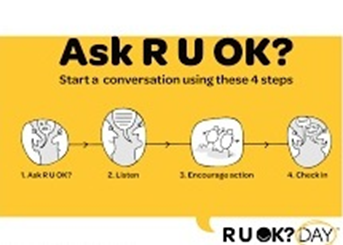R U OK?

Which translates into Are you OKay was the subject of last week’s Zoom meeting . The speaker was Stephen Dowling who was the Conversation Champion of Australia RU OK? for 2019 and is passionate about translating evidence based research like MHFA into practice and building the capacity of individuals, families, organisations and communities to be involved in mental health support and suicide prevention.
R U OK? is an Australian non-profit suicide prevention organisation, founded by advertiser Gavin Larkin in 2009. It revolves around the slogan "R U OK?" (are you okay?), and advocates for people to have conversations with others. The organisation has a dedicated R U OK? Day, held annually on the second Thursday of September, which encourages Australians to connect with people who have emotional insecurity, to address social isolation and promote community cohesiveness.[1]
R U OK? works collaboratively with experts in suicide prevention and mental illness, as well as government departments, corporate leaders, teachers, universities, students and community groups. Its activities also align with the Australian Government's LIFE Framework.[2]
Ru OK survey released in November 2019 highlights 40% of small business ownersreport having high levels of stress due to: long working hours , •social isolation , •customer demands •cash flow issues •conflicting demands home and work 72% do not seek any help
Signs to look out for during physical distancing:
Posting more or less than usual online Ignoring messages or cancelling virtual hangouts
Job loss or reduction in hours of work or income
Living on their own feeling anxious, overwhelmed or stressed
How do we know if someone needs support?
Changes in mood?
Changes in their physical appearance?
Changes in behaviour?
Changes in how thoughts are expressed?
Experiencing a major change or under a lot of pressure?
Appear to be overwhelmed by tasks they had recently found manageable?
Do they seem confused or irrational, moody or unable to switch off concerned they could be a burden. Often they are lonely or lacking self-esteem and concerned they’re trapped or in pain
Are they experiencing mood swings becoming withdrawn and changing their online behaviour losing interest in what they used to love or unable to concentrate They could be less interested in their appearance or personal hygiene and behaving recklessly There are often changes in their sleep patterns
HERE IS THE PLAN TO START
A CONVERSATION AIMING
TO CHANGE THEIR LIFE
R U OK? inspire and empower everyone to meaningfully connect with the people around them and start a conversation with anyone who may be struggling with life.You don't need to be an expert to reach out - just a good friend and a great listener. Start a conversation with the following four steps:
•Help them open up by asking questions like “How you going?” or ”What’s been happening?” or “I’ve noticed you haven’t been yourself lately. How are you travelling?”
•Make an observation. Mention the specific that have made you concerned for them, like “I’ve noticed that you seem really tired lately” or “You seem less chatty than usual. How you going?”

